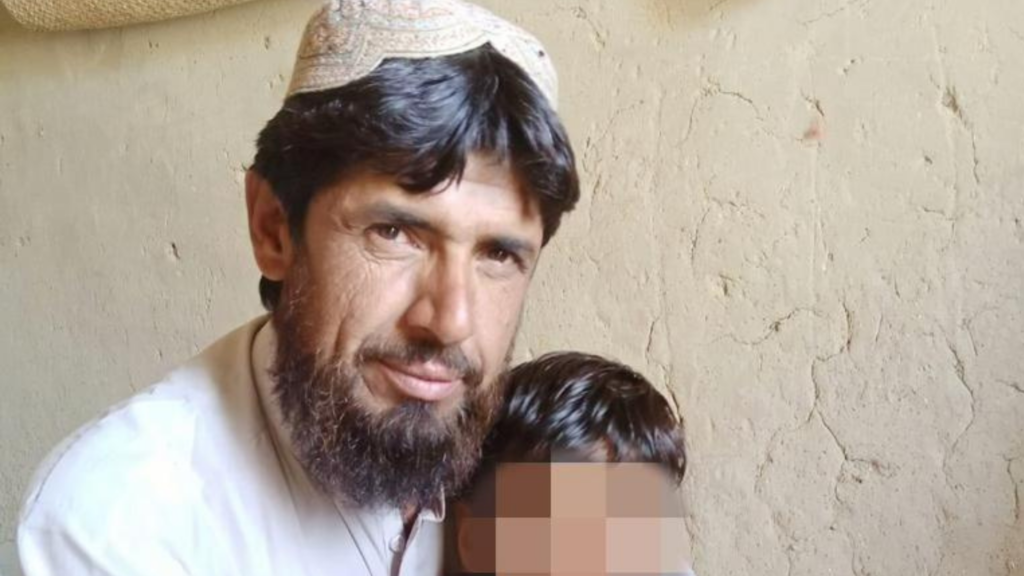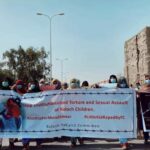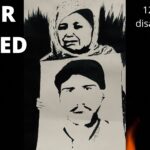On May 3, 2021, two civilians were killed in Panjgur by, as usual, ‘unknown gunmen’ in a Vigo pickup truck. The truck stopped the victim’s vehicle in the centre of Panjgur city of the Pakistani province of Balochistan. The victims of the shooting were identified as Khan Dost and Ali Amir Bakhsh.
Mr. Khan Dost was a farmer and a loving father of five children. The 45-year-old was also known as Khan Jan (Jan meaning beloved) among his family and friends. He was previously abducted by the Pakistani army´s paramilitary forces the Frontier Corps on the 17th of March 2017 from his home in Resh Peesh village in Parom. On March 23, 2017, his family reported the illegal abduction to the central police station in Panjgur to register the case but the police fearing reprisal from the powerful military establishment refused to do so. Multiple attempts were made to register the report, but all in vain.
According to the Human Rights Council of Balochistan’s records and information, around 35 military vehicles cordoned off the area on the day when he was first abducted by the military. They conducted a house-to-house search operation, looted valuables and subjected women and children to physical torture. During the raid, five civilians were abducted. Other victims were recognized as Haji Abdul Salam, Majeed, Imran Hakeem and Shakir.
Imran Hakeem, a relative to Mr. Khan, is now living in exile in the Netherlands and is willing to talk about his ordeal. He said that the military raided several houses that day and abducted many. They were taken to the main military camp in Parom. “The military tortured us and did not allow us to sleep. They interrogated us about Baloch militants and their activities. We were kept in solitary confinement in tiny rooms, blindfolded. An FC soldier took everything from my pockets,” Imran said.
He also said that after abducting him, the military went to four or five other villages and conducted a house-to-house search. The military officials told them that they had supported the Baloch militants and that was why they were being abducted. Imran denies the allegations. After nine days, Imran was released. He fled Balochistan, taking more than a year-long treacherous journey on foot from Balochistan to the Netherlands. Khan Dost was not lucky to be released in nine days. He was kept in the dungeons for more than two years and when he was ultimately released. Unlike Imran, Khan Dost chose to stay at home, which proved to be a fatal choice later. Imran insists Khan Jan´s killers were members of the army and its local death squads.
I had received Mr. Dost´s documents from his family in January 2018 and submitted his case to the UN’s Working Group on Enforced or Involuntary Disappearance (WGEID) on 25th January 2018. He was registered with the WGEID under case number 10008135. The case was discussed during WGEID´s 115th session held in Geneva from April 23 to May 2, 2018. As a result of these discussions, the WGEID transmitted the case to Pakistan to be investigated on May 23, 2018.
The Chair-Rapporteur, Bernard Duhaime of the committee, wrote back to the HRCB about Khan Dost on June 6, 2018, saying, “I would also like to refer to the cases of Mr. Dost Khan (case n° 10008135)” and many others. At the session, the Working Group considered the cases and transmitted them to the Government of Pakistan on October 25, 2018. In transmitting the cases, the Working Group expressed its hope that appropriate investigations would be carried out in order to clarify the fate and whereabouts of the aforementioned individuals and to protect their rights.”
It was one of the few cases where, due to the timely reporting and the Working Group’s actions and pressure on the Pakistani government, Mr. Dost was released on January 16, 2020.
According to our reports, he was victimized because of his kinship with Baloch activists, most importantly his younger brother, Fazal Sher. Mr. Fazal had also been abducted from Quetta by the Pakistani military and tortured when he was a university student. He was released later. He left Balochistan to escape extrajudicial persecutions. He is a revolutionary poet.
Mr. Fazal wrote on his Twitter with the pictures of the murdered, “the killing of brave sons is your destruction.” He also shared a photo of Mr. Khan holding a young boy.
It is essential and relevant to mention that the military-backed death squads’ members are recruited from among the Baloch population and given tasks to harass, abduct and target and kill political and human rights activists, military critics and the people with secular ideals. In return, they are given a free hand to blackmail and extort businessmen and indulge in the lucrative drug transportation from Afghanistan to Balochistan´s seashores. The criminal activities of these death squads have recently increased to unparalleled levels mainly due to the army outsourcing its genocidal policy to these criminals. Many civilians have used online platforms and campaigns to vent their anger against these tactics.
Thousands of forcible disappearances and kill and dump cases from Balochistan have historically been a big international issue for Pakistan. The issue is being reported by different international organizations, including the UN’s WGEID Committee and international media although there is a complete media blackout by the Pakistani media. The Pakistani government has been pressurized on this issue by Amnesty International, the Human Rights Watch and WGEID. The Pakistani authorities have been threatening the victim’s families to withdraw their loved ones’ cases from these organizations and change their narratives. Many families succumbed to this pressure and stopped processing the already submitted cases. Most families do not take any initiative to report the fates of their forcibly disappeared loved ones due to fear of persecution of other family members. However, hundreds of families have still exposed and reported the forcible disappearance and killings of their loved ones.
Therefore, now the military and other security agencies of Pakistan are using the death squads to carry out attacks on Balochistan’s political, human rights and media activists, including harassing their family members to blackmail them. It is seen as an attempt by the military to avoid critics and pressure from world organizations.

Posted inFeatured reports

